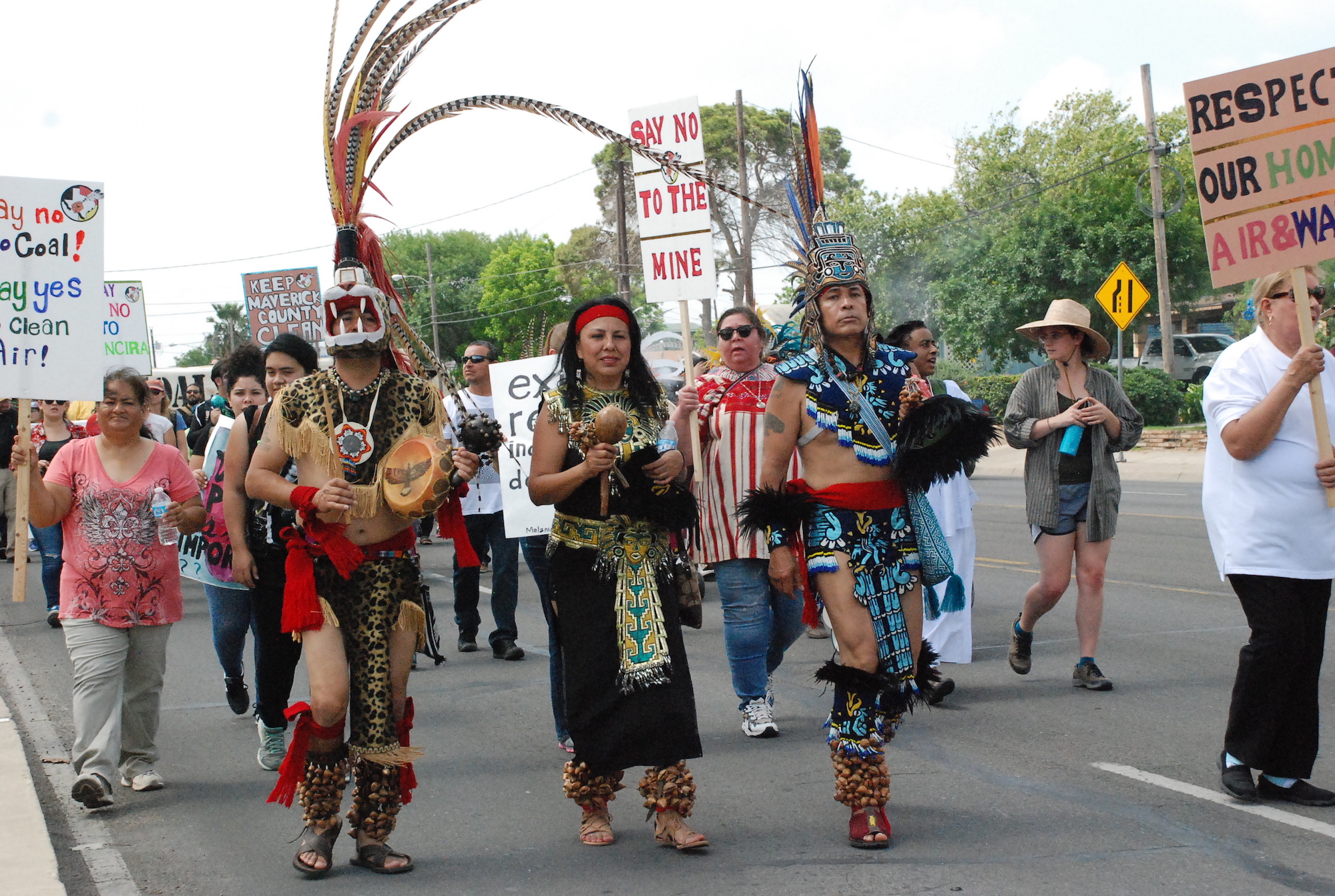
Native Groups Open New Front Against Border Coal Mine
Tribal leaders say binational coal companies are mining on sacred ancestral lands.
Above: Native Texans march against the Dos Republicas Coal Partnership in Eagle Pass.
Native Texans, joined by other Native American allies and environmental advocates, led a nearly 200 person march in Eagle Pass on Saturday against the Dos Republicas Coal Partnership. The group beat drums, sang, chanted and danced in traditional dress, calling for the mine’s closure.
Efforts to block the mine over environmental concerns have so far failed. Now, opponents hope that bringing attention to the potential archaeological and historical repercussions of mining on tribal land could open a new front in the fight.
The Mexican-owned Eagle Pass Mine, which is affiliated with Plano’s North American Coal Corporation and Mexico’s Minera Del Norte, together known as the Dos Republicas Coal Partnership, started production at the end of 2015. Native groups say the low-grade coal is located on sacred ancestral land, and that coal companies didn’t follow federal protocols requiring notification of local tribal organizations before they began mining.
Representatives from the Lipan Apache Band of Texas, Pacuache Band Coahuiltecan Nation, Carrizo-Comecrudo Tribe of Texas, and both the American Indian Movements of Central Texas and Southern California participated in the march. The groups are concerned that the mining site is located on historically sacred land and may contain ancestral burial remains.
Dos Republicas’ 2011 permit application, submitted to the Texas Railroad Commission, lists nearly 100 archeological sites, though the Texas Historical Commission determined that the sites are “unlikely to yield additional data important to our understanding of the local prehistory.” If human remains are discovered, a new assessment is required.
“It’s in Dos Republicas’ interest if they find anything to just destroy them, and that’s what we fear is happening, but obviously we’re not there to see it,” said George Baxter, president of the Maverick County Environmental and Public Health Association, an advocacy group that opposes the mine and was also present at the march.
Dos Republicas spokesman Rudy Rodriguez told the Observer that the mine has already been through a “lengthy and thorough process” in order to receive its permit from the Texas Railroad Commision.
The Dos Republicas first applied for a permit in 1994, but widespread public protest didn’t begin until 2011, when the Texas Railroad Commission approved a renewal of the mine’s permit. Dos Republicas has faced several court challenges since, winning its latest legal battle in 2015 in a suit brought by Maverick County against the coal company and the Texas Railroad Commission in Texas’ 3rd Court of Appeals. In February, Maverick County asked the Texas Supreme Court to review the case.
Dos Republicas has said in court documents and in media reports that the mine followed the protocols required by the EPA’s tribal consultation policies and the National Historic Preservation Act.
Jonathan Hook, a member of the Cherokee Nation who helped organize the march along with the American Indian Movement of Central Texas and the Sierra Club, told the Observer that he doesn’t believe those claims.
“[Dos Republicas says] they contacted someone in 1994, Kickapoo, but they lost the records,” Hook told the Observer. “They should contact any of the tribes that were historically in this area. That would have been the Comanche, Mescalero Apache, Kiowas, certainly many other tribes that came through this area.”
Dos Republicas acknowledges in court documents that several “interested parties,” including the Kickapoo Tribal Council, were invited by the EPA to participate in a consultation process. They say the Kickapoo accepted, however, the Comanche Tribal Council declined and Mescalero Apache Tribal Council did not respond. The response letters from the tribes are not part of the court documents.
On Saturday, protesters marched 8.5 miles from the Eagle Pass-Piedras Negras International Bridge to Dos Republicas. People came from nearly a dozen tribes, some from as far away as Los Angeles to join the Texas tribes and other supporters from Austin and San Antonio.
“We wanted to support the indigenous people of the area, we wanted to support AIM Central Texas,” said Graywolf, director of the American Indian Movement of Southern California. “It’s our responsibility that we come here, we stand up and speak out about these issues.”
Besides potential harm to important archaeological sites, critics of the mine also say they’re worried about pollution from coal dust as well as water contamination from the mine..
Jeff Taylor, who owns property near the mine, said that he appreciates that the mine provides jobs, but has concerns about its environmental impact.
“We’re right up next to the mine and we have coal dust over everything. You can walk into my backyard and get coal dust all over your pants and your shoes,” Taylor said.
Native groups and community members say they’re determined to continue the fight.
“We’ve been fighting against this mine since 2011,” Baxter said. “We’re working together to try and keep the mine from expanding and hopefully to shut down the operation that’s already in existence.”


